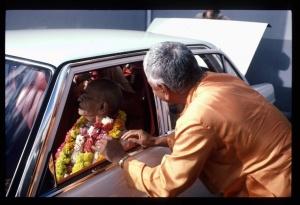CC Madhya 24.123: Difference between revisions
m (1 revision(s)) |
No edit summary |
||
| Line 1: | Line 1: | ||
{{ | [[Category:Sri Caitanya-caritamrta - Madhya-lila Chapter 24|C123]] | ||
<div style="float:left">'''[[Sri Caitanya-caritamrta|Śrī Caitanya-caritāmṛta]] - [[CC Madhya|Madhya-līlā]] - [[CC Madhya 24|Chapter 24: The Sixty-One Explanations of the Atmārāma Verse]]'''</div> | |||
<div style="float:right">[[File:Go-previous.png|link=CC Madhya 24.122|Madhya-līlā 24.122]] '''[[CC Madhya 24.122|Madhya-līlā 24.122]] - [[CC Madhya 24.124|Madhya-līlā 24.124]]''' [[File:Go-next.png|link=CC Madhya 24.124|Madhya-līlā 24.124]]</div> | |||
{{CompareVersions|CC|Madhya 24.123|CC 1975|CC 1996}} | |||
{{RandomImage}} | |||
==== TEXT 123 ==== | ==== TEXT 123 ==== | ||
<div | <div class="verse"> | ||
mumukṣavo ghora-rūpān | :mumukṣavo ghora-rūpān | ||
hitvā bhūta-patīn atha | :hitvā bhūta-patīn atha | ||
nārāyaṇa-kalāḥ śāntā | :nārāyaṇa-kalāḥ śāntā | ||
bhajanti hy anasūyavaḥ | :bhajanti hy anasūyavaḥ | ||
</div> | </div> | ||
| Line 14: | Line 18: | ||
==== SYNONYMS ==== | ==== SYNONYMS ==== | ||
<div | <div class="synonyms"> | ||
''mumukṣavaḥ''—those who are perfectly learned, who desire the highest perfection, and who, unlike demons and nondevotees, are never envious of anyone; ''ghora-rūpān''—demigods with fearful bodily features; ''hitvā''—giving up; ''bhūta-patīn''—the forefathers (''prajāpatis''); ''atha''—therefore; ''nārāyaṇa-kalāḥ''—the plenary expansions of Lord Nārāyaṇa; ''śāntāḥ''—very peaceful; ''bhajanti''—they worship; ''hi''—certainly; ''anasūyavaḥ''—nonenvious. | |||
</div> | </div> | ||
| Line 21: | Line 25: | ||
==== TRANSLATION ==== | ==== TRANSLATION ==== | ||
<div | <div class="translation"> | ||
"'Those who want to be relieved from the material clutches give up the worship of the various demigods who have fearful bodily features. Such peaceful devotees, who are not envious of the demigods, worship the different forms of the Supreme Personality of Godhead, Nārāyaṇa.' | |||
</div> | </div> | ||
| Line 28: | Line 32: | ||
==== PURPORT ==== | ==== PURPORT ==== | ||
<div | <div class="purport"> | ||
This is a quotation from the Śrīmad-Bhāgavatam ([[SB 1.2.26]]). Those who actually want the highest perfection worship Lord Viṣṇu in His different incarnations. Those who are attracted to the materialistic way of life and who are always agitated and full of anxiety worship demigods who appear fierce—demigods like goddess Kālī and Kāla-bhairava (Rudra). The devotees of Kṛṣṇa, however, do not envy the demigods or their worshipers but peacefully render devotional service to the incarnations of Nārāyaṇa instead. | This is a quotation from the [[Srimad-Bhagavatam|''Śrīmad-Bhāgavatam'']] ([[SB 1.2.26]]). Those who actually want the highest perfection worship Lord Viṣṇu in His different incarnations. Those who are attracted to the materialistic way of life and who are always agitated and full of anxiety worship demigods who appear fierce—demigods like goddess Kālī and Kāla-bhairava (Rudra). The devotees of Kṛṣṇa, however, do not envy the demigods or their worshipers but peacefully render devotional service to the incarnations of Nārāyaṇa instead. | ||
</div> | </div> | ||
__NOTOC__ | |||
<div style="float:right; clear:both;">[[File:Go-previous.png|link=CC Madhya 24.122|Madhya-līlā 24.122]] '''[[CC Madhya 24.122|Madhya-līlā 24.122]] - [[CC Madhya 24.124|Madhya-līlā 24.124]]''' [[File:Go-next.png|link=CC Madhya 24.124|Madhya-līlā 24.124]]</div> | |||
__NOTOC__ | |||
__NOEDITSECTION__ | |||
Revision as of 10:00, 14 September 2021

A.C. Bhaktivedanta Swami Prabhupada
TEXT 123
- mumukṣavo ghora-rūpān
- hitvā bhūta-patīn atha
- nārāyaṇa-kalāḥ śāntā
- bhajanti hy anasūyavaḥ
SYNONYMS
mumukṣavaḥ—those who are perfectly learned, who desire the highest perfection, and who, unlike demons and nondevotees, are never envious of anyone; ghora-rūpān—demigods with fearful bodily features; hitvā—giving up; bhūta-patīn—the forefathers (prajāpatis); atha—therefore; nārāyaṇa-kalāḥ—the plenary expansions of Lord Nārāyaṇa; śāntāḥ—very peaceful; bhajanti—they worship; hi—certainly; anasūyavaḥ—nonenvious.
TRANSLATION
"'Those who want to be relieved from the material clutches give up the worship of the various demigods who have fearful bodily features. Such peaceful devotees, who are not envious of the demigods, worship the different forms of the Supreme Personality of Godhead, Nārāyaṇa.'
PURPORT
This is a quotation from the Śrīmad-Bhāgavatam (SB 1.2.26). Those who actually want the highest perfection worship Lord Viṣṇu in His different incarnations. Those who are attracted to the materialistic way of life and who are always agitated and full of anxiety worship demigods who appear fierce—demigods like goddess Kālī and Kāla-bhairava (Rudra). The devotees of Kṛṣṇa, however, do not envy the demigods or their worshipers but peacefully render devotional service to the incarnations of Nārāyaṇa instead.